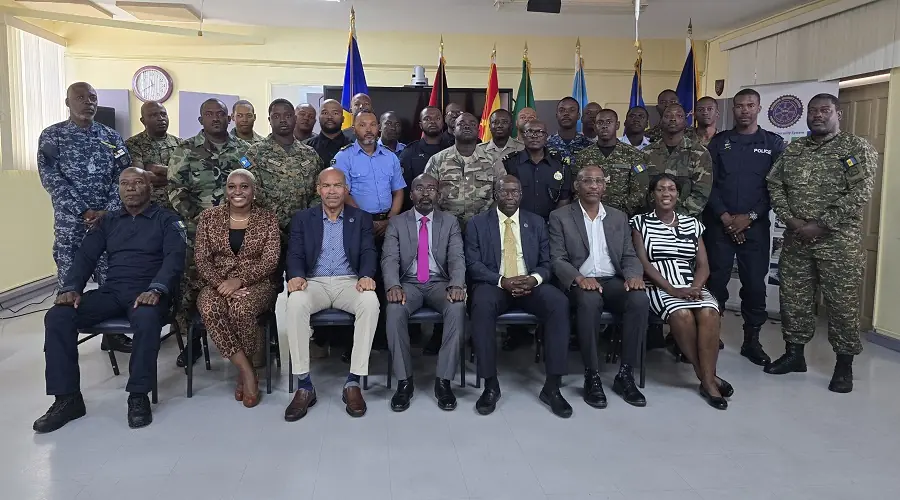TWENTY-FOUR OFFICERS SUCCESSFULLY COMPLETE RANGE MANAGEMENT LEVEL 3 CVQ
Law enforcement officials should never be “high-handed or show-offish” when using firearms.
This was strongly emphasised by Director of Emergency Logistics and Policy, Ministry of Home Affairs, Barbados, Colonel (Ret’d) Glyne Grannum, during his feature address at the closing ceremony for the Regional Security System’s Range Management Qualification Level 3 CVQ Course, recently. He was at the time speaking to the graduates of who comprised of Officers from police, military, prison, customs and security agencies from RSS Member States.
Reminding the Officers of the framework which governs the use of armed force by state security personnel, Col. Grannum stressed the importance of continuous training and adherence to the policy.
“The framework of legal, ethical and procedural principles [was] designed to balance public safety with individual rights. While rules for opening fire may vary from jurisdiction and between services, a triad of core principles of legal accountability, necessity and proportionality are universal. So continuous training and adherence to legal framework are critical to minimising harm and sustaining public trust,” he explained.
Noting that the course participants were trained in various aspects of firearm usage, Col. Grannum emphasised the dangers associated with improper use of firearms, and stressed that it could be very costly if due care was not taken.
“You could alter the course of somebody’s life, you could have an effect at the strategic, political and international levels. Consequences could include criminal prosecutions, internal disciplinary action, civil lawsuits and independent oversight…Take careful note that the legal basis is rooted in international standards,” he opined.
The Emergency Logistics Director also urged the Officers to consider the psychological effects that could stem from the mere presence of a firearm, and warned them not to brandish their weapon or operate in a cavalier manner.
“Police Officers and their military counterpart must reasonably believe that lethal force is immediately necessary to prevent harm, for example to stop the perpretrator using a firearm in threatening civilians or threatening members of the routine.
Embedded in the use of force policies is human rights law requiring a balance between the level of the threat and the force intensity. Necessity and proportionality are interdependent, as force must be both unavoidable and appropriate to the threat. And accountability reinforces adherence to the first two principles by deterring misconduct and ensuring public trust,” he stated.
Manager of the Training Institute, Captain (Dr) Dreana Marshall-Stuart, explained that the newly introduced Level 3 Caribbean Vocational Qualification (CVQ) is a regionally recognised certification designed to accredit the competence of those who manage the safe conduct of firing activities on ranges.
“This bespoke qualification for members of defence and security forces allowed the RSS TI to redesign their existing curriculum to cover safety for range activities, preparation of the range for firing activities, production of written instructions to support firing activities, range accident / incident procedures, and closing the range after firing restrictions.
“The successful completion of the Range Management Course marks a significant step forward in the ongoing efforts to improve law enforcement training and military operational capabilities in the RSS Member States,” she explained.
The Range Management Course was conducted by the RSS Training Institute in collaboration with Barbados’ Technical and Vocational Education and Training (TVET) Council.



